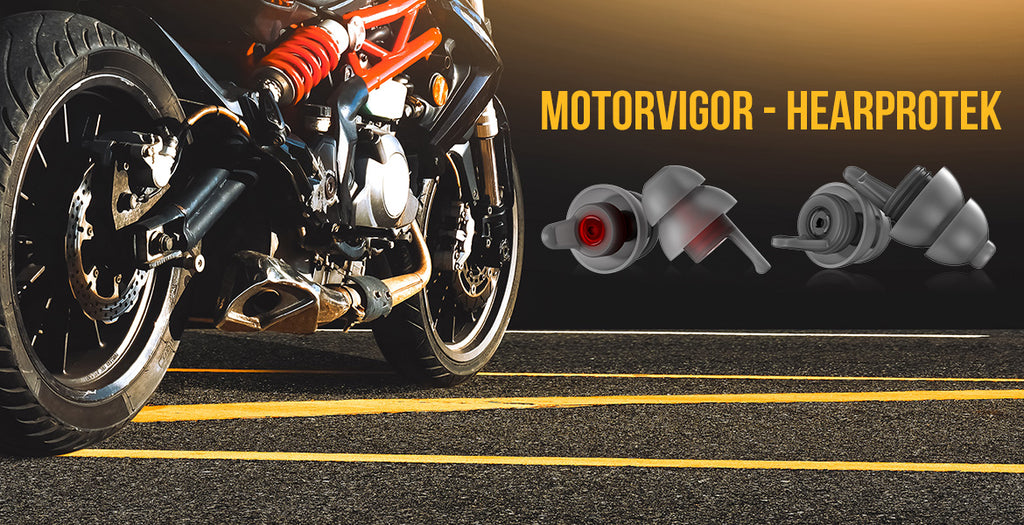When it comes to the thrill and freedom associated with riding a motorcycle, there's nothing quite like it. The wind in your face, the open road ahead; it's an unparalleled experience. However, it's critical to recognize that this exhilarating ride can have repercussions, specifically concerning your hearing. To truly enjoy the freedom of the open road for years to come, it's vital to protect your ears.
In this comprehensive guide, we'll delve into the importance of auditory safety during motorcycling, discuss the efficacy of helmets in safeguarding your hearing, and explore how to protect your ears, focusing on the value of noise-reducing earplugs.
How Riding a Motorcycle Harms My Hearing?

As you speed along the highway, the roaring engine isn't the only sound that can harm your ears. In fact, wind noise is a significant culprit. Wind noise can escalate to dangerous levels, often surpassing 100 decibels (dB). To put this into context, sounds at or above 85 dB can cause hearing loss if you are exposed to them for extended periods. Consistent exposure to high noise levels can lead to irreversible damage, such as tinnitus or even permanent hearing loss. Hence, understanding the risks associated with loud noise while motorcycling is the first step in a proactive approach to safeguard your hearing.
Do Helmets Help Prevent Hearing Loss When Riding Motorcycles?
When you think of helmets, you often associate them with preventing head injuries. However, many riders assume that these helmets also offer adequate protection against noise. This is a common misconception. While helmets do provide a level of noise reduction, they are not designed to offer comprehensive hearing protection. They cut down the wind noise to some extent, but not enough to prevent potential hearing damage. Therefore, relying solely on your helmet as a means of auditory protection is misguided and may result in long-term damage. So what's the solution? Let's dig into specific protective measures you can take to guard your ears against the roar of the engine and the whoosh of the wind.
How to Protect My Ears When Motorcycling?

A highly effective way to protect your hearing while riding a motorcycle is to wear noise-reducing earplugs. These are not your average foam earplugs; motorcycle earplugs like the MotorVigor - Hearprotek High Fidelity earplugs are specially designed to fit snugly into your ears and significantly reduce dangerous noise levels while still allowing you to hear essential sounds like traffic signals and horns.
Material Matters
Opt for earplugs made from soft, pliable materials like silicone for the most comfortable fit. The MotorVigor earplugs, for instance, are made from soft silicone and feature an ergonomic dual-flange design, ensuring long-lasting comfort even under the helmet. The material should provide an excellent seal to prevent wind and engine noise from entering your ears while being soft enough for extended wear.
Noise Reduction Ratings (NRR)
Pay close attention to the Noise Reduction Rating (NRR) when selecting earplugs. The MotorVigor earplugs come with two high-fidelity filters that offer an NRR between 23 dB and 26 dB, allowing you to adjust the level of protection according to your needs. An NRR of at least 25 dB is advised for motorcycle riding. Remember, the higher the NRR, the more protection you will get.
Custom-Made Options
You can also consider custom-molded earplugs. These are made from molds of your ears, providing an unparalleled fit. Although they are more expensive, they offer superior comfort and noise reduction. The MotorVigor earplugs come with two different-sized shells to fit most ear sizes, ensuring a customized fit for maximum comfort and effectiveness.
Where to Buy

Motorcycle earplugs are available at specialized stores dealing with motorcycling gear or audiology clinics. You can also find an array of options online; just ensure you purchase from a reputable seller to guarantee product quality. The MotorVigor earplugs are priced at $17.99 and have received a 5.00 out of 5 rating based on 23 customer reviews, making them a reliable choice.
When you use high-quality, noise-reducing earplugs like the MotorVigor - Hearprotek High Fidelity earplugs, you are taking a giant leap in protecting your hearing health. It's an essential accessory that complements the protection provided by helmets, ensuring you're safeguarded against the damaging levels of noise associated with motorcycle riding.
Conclusion
Riding a motorcycle is an experience that exhilarates the senses, but it's crucial to remember that your hearing is one of those senses, and it's at risk during every ride. Helmets may offer some noise reduction, but they fall short of providing the comprehensive protection needed to prevent hearing loss. That's where specialized, high-quality earplugs like the MotorVigor - Hearprotek High Fidelity earplugs come into play. With an adjustable NRR between 23 dB and 26 dB, these earplugs offer a level of protection that is both effective and customizable.
Incorporating noise-reducing earplugs into your motorcycle gear is not just advisable; it's imperative for long-term auditory health. Whether you opt for off-the-shelf options with high NRR or go for custom-made earplugs, the investment is a small price to pay for safeguarding your hearing. Your ears will thank you, ensuring you continue to enjoy the freedom of the open road without compromising your hearing health.
FAQs
Q: What type of motorcycle helmet best protects hearing?
A: Look for a helmet with built-in noise-canceling technology to maximize wind noise reduction and hearing protection.
Q: If I experience ringing in my ears after long rides, what should I do?
A: Consider taking a break from riding to give your ears some rest. See an audiologist to check for hearing damage and get further advice.
Q: Does wearing earplugs while riding increase the risk of ear infections?
A: Choosing suitable earplug materials, maintaining cleanliness, and using disinfecting spray before and after use can greatly reduce infection risks. Regular replacement of earplugs is also important.
Q: Can traffic noise isolation from earplugs compromise safety while riding?
A: High-fidelity earplugs block noise while still allowing necessary traffic sounds to be heard, so safety is not compromised.
Q: What if my earplugs accidentally fall out while riding?
A: Have spare earplugs ready to safely stop and replace. Or reduce speed and replace them once you reach your destination.
Q: How often should I replace my motorcycle earplugs?
A: Long-term earplug use reduces seal effectiveness, so replace every 6-12 months for optimal noise isolation.












